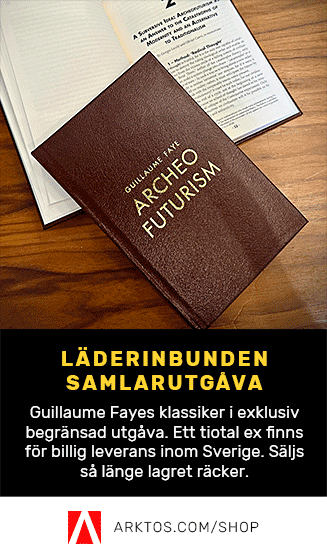Evola beskriver i Revolt against the Modern World hur det i traditionella samhällen fanns flera sätt att uppnå invigning, alltså en ontologisk förändring från ”människa” till ”mer-än-människa/non-human” (vilket också var det sätt på vilket man uppnådde odödlighet). Asketism och kontemplation är relativt välkända exempel på detta, men man menade att det även fanns en väg till invigning som präglades av handling/action. Det vi kanske idag har svårast att fullt ut ta till oss, är det heliga kriget.
Det heliga kriget utkämpas av företrädarna för Kosmos (exempelvis i form av ett traditionellt Imperium), mot företrädarna för Kaos. I Islam kallas denna aspekt det mindre heliga kriget, el-jihadul-ashgar. Men det är samtidigt ett inre krig, det större heliga kriget, el-jihadul-akbar, där man i samband med krigets strapatser och risker, tvingas konfrontera sina inre demoner, företrädarna för det som är rent mänskligt hos en (rädsla, trötthet, hunger). Tanken om det heliga kriget finns i de flesta traditioner. Våra egna förfäder menade att den som stupade i strid uppnådde odödlighet i Valhalla, och/eller tog del i Odens Vilda Jakt, Asgardsrein, Oskorein. Det finns starka paralleller till Korstågen, där ordstäv som ”Paradise lies under the shade of the swords” och ”The blood of the heroes is closer to God than the ink of the philosophers and the prayers of the faithful”. Islams koncept Jihad torde vara välkänt vid det här laget. De som stupar i rättfärdig strid, ren från materiella intressen och begär, uppnår odödlighet. De som dör en vanlig död, hamnar enligt de flesta traditioner i det grå Hades, Sheol eller Hel (och för rena nidingsmän fanns det särskilda sfärer, Tartaros, Inferno and the like. Jag antar att de som stupade i orättfärdig strid kunde hamna där, fortsatt plågade av sina försök att tillfredsställa sina lägre drifter i strid med den kosmiska ordningen). Hur som helst, här är Evola med sina egna ord om hur man i stridens centrum kan uppnå identifikation med det Högre, så länge man står fri från lägre begär. Han börjar med att citera Bhagavad-Gitan:
In order to free Arjuna from doubt and from the ”soft bond of the soul”, Krsna says:
I am the life of all living beings, and the austere life of those who train their souls. And I am from everlasting the seed of eternal life. I am the intelligence of the intelligent. I am the beauty of the beautiful. I am the power of those who are strong, when this power is free from passions and selfish desires. I am desire when this is pure, when this desire is not against righteousness.
In the end, having abandoned all personifications, Krsna manifests himself in the ”wonderful and fearful form before which the three worlds tremble”, ”vast, reaching the sky, burning with many colors, with wide open mouths, with vast flaming eyes”. Finite beings – as lamps outshone by a much greater source of light, or as circuits pervaded by a much greater current – give way, disintegrate, melt, because in their midst there is now a power transcending their form, that wills something infinitely greater than anything that as individual agents they may will by themselves. This is why finite beings ”become”, being transformed and going from the manifested into the unmanifested, from the material to the immaterial. On this basis the power capable of producing the heroic realization is clearly defined. The values are overturned: death becomes a witness to life, and the destructive power of time displays the indomitable nature hidden inside what is subject to time and death. Hence the meaning of these words uttered by Arjuna at the moment in which he experiences the deity as pure transcendence:
As roaring torrents of water rush forward into the ocean, so do these heroes of our mortal world rush into thy flaming mouths. And as moths swiftly enter a burning flame and die, so all these men rush to thy fire, rush fast to their own destruction.
Krsna also added:
I am all-powerful Time which destroys all things, and I have come here to slay these men. Even if thou dost not fight, all the warriors facing thee shall die. Arise therefore! Win thy glory, conquer thy enemies, and enjoy thy kingdom. Through fate of their own karma I have doomed them to die: be thou merely the means of my work… tremble not, fight and slay them. Thou shalt conquer thy enemies in battle.
In this way we find again the identification of war with ”the path to God”. The warrior evokes in himself the transcendent power of destruction: he takes it on, becomes transfigured in it and free, thus breaking loose from all human bonds. Life is like a bow and the soul like an arrow, the target being aimed at is the Supreme Spirit; another text of the same Hindu tradition says that what matters is to become united with the Supreme, as an arrow is united with its target. This is the metaphysical justification of war and the transformation of the lesser into the greater holy war. It also sheds further light on the meaning of the traditions concerning the transformation, in the course of the battle, of a warrior or a king into a god. According to an Egyptian tradition, Ramses Merianun was transformed in the battlefield into the god Amon, and said: ”I am like Baal in his own time”: when his enemies recognized him in the melee, they cried out: ”This is not a man; he is Sathku, the Great Warrior; he is Baal in the flesh.”
Revolt against the Modern World, Evola, s. 122-123











